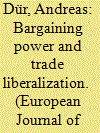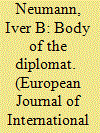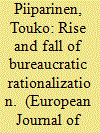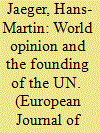|
|
|
Sort Order |
|
|
|
Items / Page
|
|
|
|
|
|
|
| Srl | Item |
| 1 |
ID:
085400


|
|
|
|
|
| Publication |
2008.
|
| Summary/Abstract |
Shortly after the creation of the European Economic Community (EEC, 1958), European countries accepted a far-reaching liberalization of their previously fairly protectionist external trade relations. I provide an explanation of this astonishing development that builds on the argument that the establishment of a customs union increases the bargaining power of its member countries in international trade negotiations. When facing discrimination from a customs union, exporters in excluded countries have an incentive to become politically active and lobby their governments for relief. This increase in exporter lobbying, in turn, weakens the negotiating position of excluded countries in international trade negotiations by making them more eager to achieve a negotiated agreement that lowers the external barriers of the customs union.
|
|
|
|
|
|
|
|
|
|
|
|
|
|
|
|
| 2 |
ID:
085401


|
|
|
|
|
| Publication |
2008.
|
| Summary/Abstract |
Over the past two decades, the body has emerged as an increasingly important focus of study in the social sciences generally, but little work has been done on it in International Relations. Drawing on a disparate yet voluminous literature on gender, as well as on Bourdieu's analysis of class, this article demonstrates the importance of gendered and classed bodies within the Norwegian Ministry of Foreign Affairs (MFA). Part one, which is based on archival work and interviews, details the emergence of women within the diplomatic service. In part two, which is based on interviews and ethnographic data, I postulate the existence of three masculinity scripts and three femininity scripts within MFA discourse.
|
|
|
|
|
|
|
|
|
|
|
|
|
|
|
|
| 3 |
ID:
085399


|
|
|
|
|
| Publication |
2008.
|
| Summary/Abstract |
This article argues that the contemporary American empire displays two structural limits. The first refers to geographical limits. As opposed to most of its imperial predecessors, the logic of contemporary US power militates against direct, territorial domination as a means of sustaining global hegemony. The second limitation, tightly linked to this first one, is that of power defined in a conventional sense as the capacity to secure outcomes. Consequently, since 1945 the USA has generally projected its global power through open doors (capitalist markets) and closed frontiers (sovereign territorial states). The article explores the peculiar limits to US empire with reference to two of its principal western precursors - the Roman and British empires - and concludes that the recent invasion and occupation of Iraq highlights the perils of an American strategy that seeks to conquer territories militarily and politically control their populations.
|
|
|
|
|
|
|
|
|
|
|
|
|
|
|
|
| 4 |
ID:
085403


|
|
|
|
|
| Publication |
2008.
|
| Summary/Abstract |
If it is correct to say that the UN's policy has been dominated by great powers, then it is also true that the academic debate on the UN's failures in general, and the Rwandan tragedy in particular, has been dominated by an emphasis on Realpolitik , which has limited and precluded analysis of other possible causes of the UN's malfunctions. Power politics alone cannot fully explain why the downfall of `grand strategies' for the UN envisaged in Secretary-General Boutros Boutros-Ghali's An Agenda for Peace (1992), most notably conflict prevention, was almost as rapid as their emergence. By drawing upon new empirical evidence from interviews and by reflecting on theories of bureaucratization, this article explores one previously ignored mechanism underlying the failure of the Agenda in general and the Rwandan case in particular, namely bureaucratic rationalization.
|
|
|
|
|
|
|
|
|
|
|
|
|
|
|
|
| 5 |
ID:
085398


|
|
|
|
|
| Publication |
2008.
|
| Summary/Abstract |
While `world opinion' is a staple in political discourse, the concept has received little attention in IR. Locating it along the `realist-idealist' divide, existing studies have conceptualized `world opinion' empirically, as an aggregative or intersubjective phenomenon, annexed or opposed to state sovereignty, and embodying a normative standard. Drawing on Luhmann's conception of public opinion and Foucault's governmentality approach, this article reconceptualizes `world opinion' discursively (functionally and semantically), as a medium of communication that enables post-sovereign forms of international governance irrespective of an inherent normativity.
|
|
|
|
|
|
|
|
|
|
|
|
|
|
|
|
|
|
|
|
|